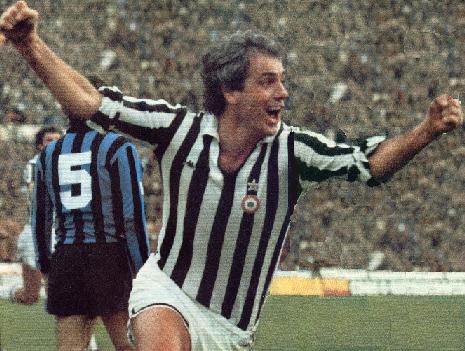Golden Great: Roberto Bettega
Roberto Bettega’s passion for Juventus was in his genes and the Bianconeri legend spent his entire Serie A career in Turin. Dave Taylor reports on the legend that is still an integral part of the club today
Silver bullet
There is a picture of an Italian international taken over a quarter of a century ago that inspired my devoted interest in calcio Italia. It was an action image of the former Azzurri and Juventus legend Roberto Bettega scoring against England. Until then Juve were just another foreign club that always seemed to beat English opposition. Bettega, in this particular picture, is in headlong flight almost parallel to the ground with the ball just a few yards from his forehead as it hurtles towards goal.

Being an England fan it was as welcome as Bernard Manning at a feminist’s meeting, but as an appreciator of fine football it was a perfect representation of the most beautiful game in the world. In the background a bemused Emlyn Hughes and two other equally dumbstruck England defenders look on helplessly. It came as the striker scored Italy’s second goal in the qualifying rounds for the 1978 World Cup in Rome’s Olympic Stadium in November 1976. It is an image that showed just one aspect of the legend he became to Italian and Juventus fans alike.
The goal, like the first from Fiorentina’s Giancarlo Antognoni in the 2-0 defeat, was made purely in Turin by Juve players. The moustached Franco Causio had escaped the attention of the England defenders and was hovering over on the left flank. He passed to the overlapping Romeo Benetti. The midfielder’s cross from the touchline was met by Roberto bursting through a befuddled English defence at the speed of a silver bullet. He connected at waist high with a full-length dive to place it beyond a despairing Ray Clemence in goal.
Signor Bettega was a player of immense intelligence and became one of the world’s most feared strikers. He was seen by many as the natural heir to West Germany’s Gerd Muller in the 1978 World Cup. He scored an incredible seven goals in the build-up to the semi-final defeat by Holland and along with Antognoni and Torino’s Francesco Graziani formed a deadly attacking trio. However, despite making his international debut at 25 it wasn’t until he reached his late twenties that he gathered a full resolution for the game.
His Azzurri debut came in a 1-0 defeat of Finland in June 1975, in the qualifying stages of the European Nations Cup of 1976. However, it wasn’t until two years later that he really made his international mark. Playing against Finland, this time in the qualifying rounds of the 1978 World Cup, Roberto and Italy ripped the Scandinavians apart in October 1977. Running them ragged Bettega scored the first, second, fourth and fifth in the 6-1 victory. It was all the more satisfying for Bettega as it was in front of his home crowd in Turin’s Stadio Comunale.
Born in that same city, he grew up with Juventus as a youngster when he joined their Primavera side in 1961. He was initially fielded by then Coach Pedrale as a midfielder, but Pedrale’s successor Rabitti saw Bettega’s scoring potential and moved him upfield. Like so many youngsters of today’s generation in Serie A, the forward needed match experience. After sitting on the bench in the 1968-69 campaign he was sent on loan to Varese in Serie B. It was there, under former Milan legend Nils Liedholm, that Bettega hit 13 goals to help the side finish top and gain promotion to Serie A.
Starting his Juve career proper the following year, he made his top-flight debut in the 1-0 defeat of Sicilian side Catania on August 27, 1970. It was the start of a glorious 11-year career with the Old Lady that saw him pick up seven League titles under three different Coaches. His first Scudetto came in his second season playing under Cestmir Vycpalek. But not everything was going as it should. In January 1972, Bettega scored his tenth goal in 14 games to see off Fiorentina but ended the day in hospital with breathing difficulties. It was a problem that kept him away from the game for five months. But Bettega proved strong enough to return, just as he did in the early 1980s after rupturing knee ligaments in a European game against Anderlecht.
He was back for the 1972-73 season in which Juventus President Giampiero Boniperti said: "The best signing for this season will undoubtedly be Roberto Bettega." The League title brought a smile back to Bobby-gol’s face even if it turned sour in Europe when they were beaten by Ajax in the European Cup Final.
Carlo Parola took over as the Bianconeri Coach and they went on to win their third Scudetto of the 1970s with almost the exact side that had one the previous two titles. But it wasn’t until Giovanni Trapattoni took over as boss that Juve became the super side of the 1970s, providing nine of the side that took Italy as far as the semi-finals in the Argentina World Cup. Bettega played alongside some of the biggest world stars of that decade including Dino Zoff, Antonio Cabrini, Marco Tardelli, Claudio Gentile, Paolo Rossi, Gaetano Scirea, Beppe Furino and Pietro Anastasi. Yet for all their regular appearances in Europe, Bettega’s Juve only won the UEFA Cup in 1977. They were again beaten in the European Cup Final in 1983 by underdogs Hamburg in Athens. That was Bettega’s last game for the Bianconeri before joining Toronto Blizzard in Canada.
On the international scene, after Cagliari’s Gigi Riva was forced to retire in the mid 1970s, Italy were searching for a left-sided forward after failing to win for nine games in a row. They needed a newer version of the Cagliari legend, an individual who could be relied upon to change a game. Enter Bettega for the Finland victory. But even then Italy were still floundering and it took three or four games for Roberto and the Azzurri to find their feet before they started to click and were only stopped from reaching the World Cup Final after the 2-1 defeat by Holland in the semi-finals.
There were few similarities between Bettega and Riva, possibly only the fact that they were both left footed really linked them. Where Bettega was sleek and willow-like, Riva was a barrel chested powerhouse. Where the Juve forward delicately threaded his way through defences to tuck balls away neatly, Riva just powered through and cannoned the ball taking the 'keeper over the line with it if he was foolish enough to try and stop it. Then there was Bettega’s knack of bursting forward over the first few yards, like a world class 100 metre sprinter, a gift which distinguishes the great from the good. At times he appeared to be simply coasting, that is until the ball came within playing distance. He would then use his astonishing turn of pace, cut loose and zero in on goal.
Italy and Juve always had alternatives with Bettega up front. They could play it through to him or launch it over the top of the defence and Roberto’s anticipation could be trusted to do the rest. In his first 12 appearances he scored 13 for the Azzurri, going on to win 42 caps and notching 19 goals in all. His penultimate game was in the 1982 World Cup qualifying match with Yugoslavia in October 1981, where he scored the all important equaliser in the 1-1 draw. His final game arrived a full two years later - after recovering from his knee injury - in the 1-0 defeat away to Romania, eventually being replaced by Alessandro Altobelli.
After retiring from Juventus he joined the managerial side eventually forming a new group at the club in 1994 along with Luciano Moggi and Antonio Giraudo, nicknamed the Triad. They hired Marcello Lippi who helped the Old Lady return to the glory days of Bettega’s footballing years to win their first League title for nine years and the rest as they say like Bettega himself is history.
STAR RATING: 8/10. A vital and respected member of the all-conquering Juventus team of the 1970s and 80s, Roberto Bettega deserves to be recognised as one of the Bianconeri’s most impressive performers. At international level, his scoring record was more than useful. An intelligent and gifted front-runner who has enjoyed immeasurable success behind the scenes at Juve.
Roberto Bettega
Born: Turin 27/12/50
Position: Forward
Ht/Wt: 1.84m/78kg
Serie A debut: Catania 0-1 Juventus, 27/9/70
Clubs: Varese, Juventus
International debut: Finland 0-1 Italy (Olympiastadion), 5/6/75
Last cap: Romania 1-0 Italy (Stadionul), 16/4/83
International caps: 42
International goals: 19
Honours:
Lo Scudetto (1972, 73, 75, 77,78, 81, 82)
Coppa Italia (1979, 83)
UEFA Cup (1977)
Source:
C4
 Buy on AliExpress.com
Buy on AliExpress.com
 Buy on AliExpress.com
Buy on AliExpress.com


